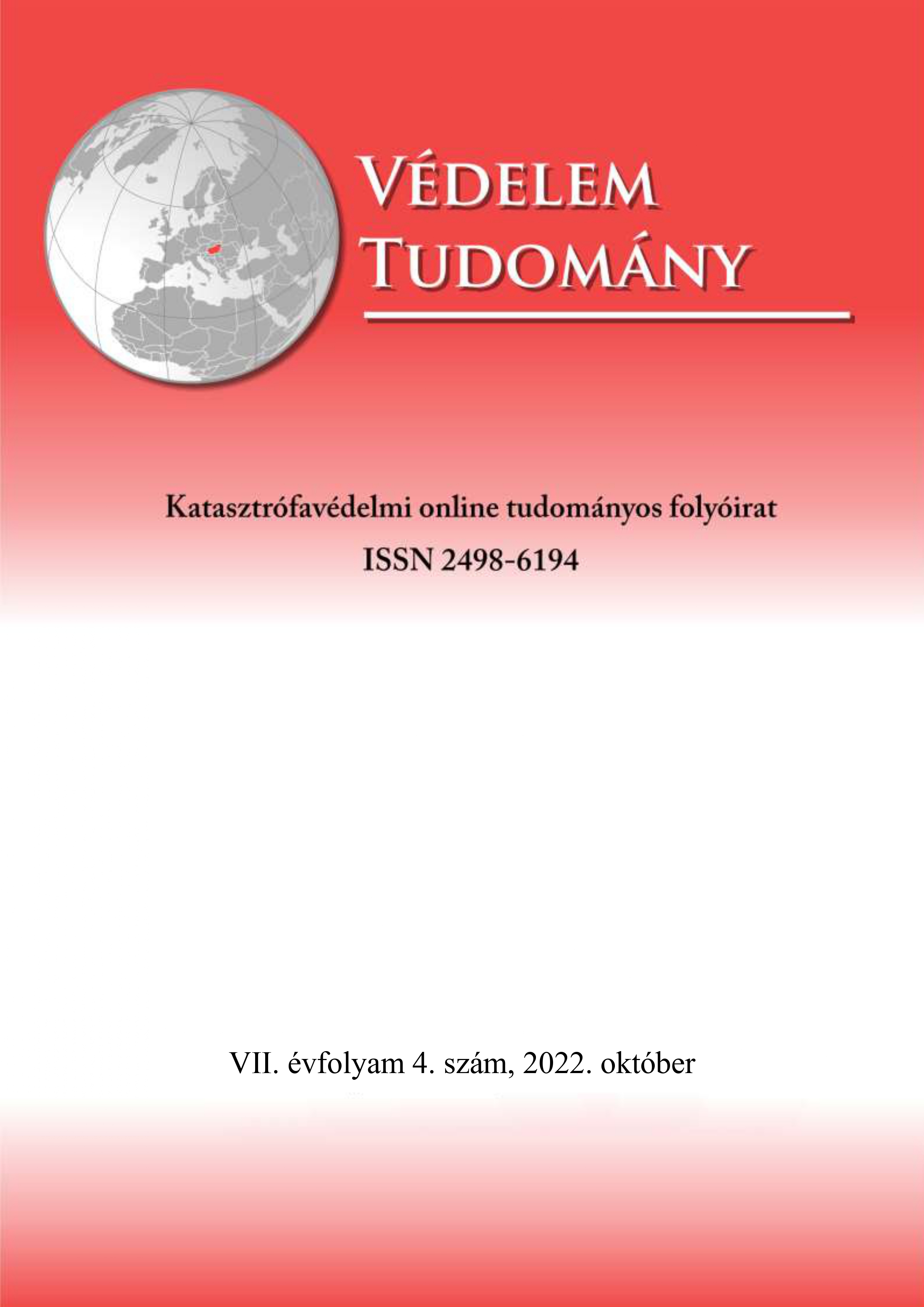Natural hazards and their management in the protection of critical systems and facilities
Abstract
The frequency of extreme weather events fostered by global warming increases, thus pose a threat to the infrastructure of our accustomed daily life - especially to the critical one. Hence the importance of managing natural hazards within the critical infrastructure protection. This study aims to support the proper critical infrastructure protection. In the first part an overview of the (changing) climate of the Carpathian basin will be given based on literature and the analysis of relevant publicly available data. Then the results of our research will be provided that focused on the current practice in the natural hazard management of the Hungarian operators of essential services. Possibilities of further improvement will also be discussed.
References
Abonyiné P.J. Infrastruktúra. Dialóg Campus Kiadó. Budapest, 2007. ISBN 978-963-9310-77-3
A 2012. évi CLXVI. törvény a létfontosságú rendszerek és létesítmények azonosításáról, kijelöléséről és védelméről
A Tanács 2008/114/EK irányelve (2008. december 8. ) az európai kritikus infrastruktúrák azonosításáról és kijelöléséről, valamint védelmük javítása szükségességének értékeléséről
https://eur-lex.europa.eu/legal-content/HU/TXT/?uri=CELEX%3A32008L0114
Nagy Rudolf - Földi László: A kritikus infrastruktúrák nemzeti programja. Polgári Védelmi Szemle, 2009. 57-71. o. 66. o.
Vámos Z. Biztonságpolitikai aspektusok. In: Bognár B., Bonyai T. Kritikus infrastruktúrák védelme I. Budapest, Dialóg Campus Kiadó, 2019. pp 11-27. ISBN 978-615- 5920-36-3
Nagy R. A természeti katasztrófák, mint globális kihívások. In: Védelem tudomány. Vol 2, No 3., pp. 156-169. 2017. ISSN 2498-6194
Muhoray Árpád - Nagy Rudolf: A katasztrófák elleni védelem rendszere a létfontosságú infrastruktúrák biztonságáért. Rendészeti Szemle, 2010. 58. évf, 4. szám, 3-18.o.
Bándi Gy. Környezetbiztonság – jövő nemzedékek védelme – elővigyázatosság. Tudományos Közlemény. Vol 2, no 3, pp 342-349. 2021. ISSN 2732-2688
Lakatos M. et al. Globális és hazai éghajlati trendek, szélsőségek változása: 2020-as helyzetkép. Scientia et Securitas. Vol 2, No 2, pp 164-171, 2021. ISSN 2732-2688
Halász L. Climate Change and Extreme Weather Events. In: Földi L., Hegedűs H. (szerk). Eff ects of Global Climate Change and Improvement of Adaptation Especially in the Public Service Area. pp 55-86. Dialóg Campus, Budapest. 2019. ISBN 978-615-6020-09-3
Pisano A. et al. New Evidence of Mediterranean Climate Change and Variability from Sea Surface Temperature Observations. Remote Sensing. Vol 12, no 1, pp 132-150. 2020. ISSN 2072-4292
Johnson N.C. et al. Increasing occurrence of cold and warm extremes during the recent global warming slowdown. Nature communications. No 9, 2018. ISSN 2041-1723
Mezősi G. A klímaváltozás és hatásai. In: Mezősi G. (szerk): Természeti veszélyek és hatásaik csökkentése. Akadémiai Kiadó, Budapest, 2021. pp. 230-249. ISBN 978-963-454-692-4
Mezősi G. Geofizikai veszélyek. In: Mezősi G. (szerk): Természeti veszélyek és hatásaik csökkentése. Akadémiai Kiadó, Budapest, 2021. pp. 42-97. ISBN 978-963-454-692-4
Mezősi G. Trópusi, mérsékelt égövi ciklonok, konvektív légmozgásokkal kapcsolatos jelenségek, veszélyek. In: Mezősi G. (szerk): Természeti veszélyek és hatásaik csökkentése. Akadémiai Kiadó, Budapest, 2021. pp. 112-133. ISBN 978-963-454-692-4
Aghababaeian H. et al. Global Health Impacts of Dust Storms: A Systematic Review. Environmental Health Insights. Vol 15, pp. 1-28. 2021. ISSN 1178-6302
Mezősi G. Hidrológiai veszélyek. In: Mezősi G. (szerk): Természeti veszélyek és hatásaik csökkentése. Akadémiai Kiadó, Budapest, 2021. pp. 137-206. ISBN 978-963-454-692-4
Antal Ö. Az árvizek és földrengések okozta katasztrófák káros hatásai elleni hatékony védekezés megvalósításának elméleti és műszaki kérdései a megelőzés időszakában. In: Pohl Á. (szerk.). Biztonság és Honvédelem. Ludovika Egyetemi Kiadó, Budapest, 2020. pp. 682- 702.
Krausmann E., Necci A. Thinking the unthinkable: A perspective on Natech risks and Black Swans. Safety Science. Vol 139, pp 1-16. 2021. ISSN 0925-7535
Arvidsson B., Johansson J, Guldaker N. Critical infrastructure, geographical information science and risk governance: A systematic cross-field review. Reliability Engineering and System Safety. Vol 213, pp 1-18. 2021. ISSN 0951-8320
Hornyacsek J. The Protection of the Population against the Impacts of Power Outages Caused by Extreme Weather. In: Földi L., Hegedűs H. (szerk). Eff ects of Global Climate Change and Improvement of Adaptation Especially in the Public Service Area. pp 87-122. Dialóg Campus, Budapest. 2019. ISBN 978-615-6020-09-3
Bács Z. Gy. A külső biztonságpolitikai környezet és annak komplexitása. In: Dobák I. (szerk). Nemzetbiztonság a XXI. század elején. pp 31-41. Ludovika Egyetemi Kiadó, Budapest. 2022. ISBN 978-963-531-638-0
Nagy R., Somogyi T. The financial infrastructure as a critical infrastructure and it's specialities. National Security Review. 2021/2, pp. 207-217. 2021. ISSN 2063-2908
Teknős L. Current Issues in Disaster Management Aspects of Global Climate Change. In: Földi L., Hegedűs H. (szerk). Eff ects of Global Climate Change and Improvement of Adaptation Especially in the Public Service Area. pp 145-162. Dialóg Campus, Budapest. 2019. ISBN 978-615-6020-09-3
Nagy Rudolf: A klímaváltozás hatása a kritikus infrastruktúrákra. Nemzet és Biztonság, Biztonságpolitikai Szemle (2010), 35-44.o.




